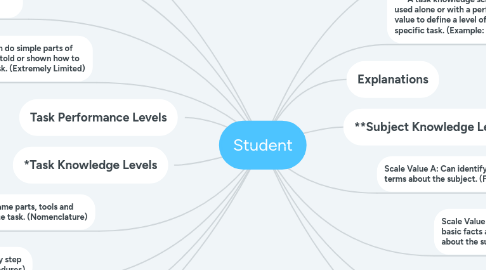Student
by Talle Knepshield

1. Scale Value 4: Can do the complete task quickly and accurately. Can tell or show other how to do the task. (Highly Proficient)
2. Scale Value 3: Can do all parts of the task. Needs only a spot check of completed work. (Competent)
3. Scale Value 2: Can do most parts of the task. Needs only help on the hardest parts. (Partially Proficient)
4. Scale Value 1: Can do simple parts of task. Needs to be told or shown how to do most of the task. (Extremely Limited)
5. Scale Value d: Can predict, isolate and resolve problems about the task. (Advanced Theory)
6. Scale Value c; Can identify why and when the task must be done and why each step is needed. (operating Principles)
7. Scale Value b: Can determine step by step procedures for doing the task. (Procedures)
8. Scale Value a: Can name parts, tools and simple facts about the task. (Nomenclature)
9. Task Performance Levels
10. *Task Knowledge Levels
11. "**" A subject knowledge scale value is used alone to define a level of knowledge for a subject not directly related to any specific task, or for a subject common to several task.
12. "*" A task knowledge scale value may be used alone or with a performance scale value to define a level of knowledge for a specific task. (Example: b and 1b)
13. Scale Value D: Can evaluate conditions and make proper decisions about the subject. (Evaluation)
14. Scale Value C: Can analyze facts and principles and draw conclusions about the subject. (Analysis)
15. Scale Value B: Can identify relationship of basic facts and state general principles about the subject. (Principles)
16. Scale Value A: Can identify basic facts and terms about the subject. (Facts)
17. **Subject Knowledge Levels
18. Explanations


